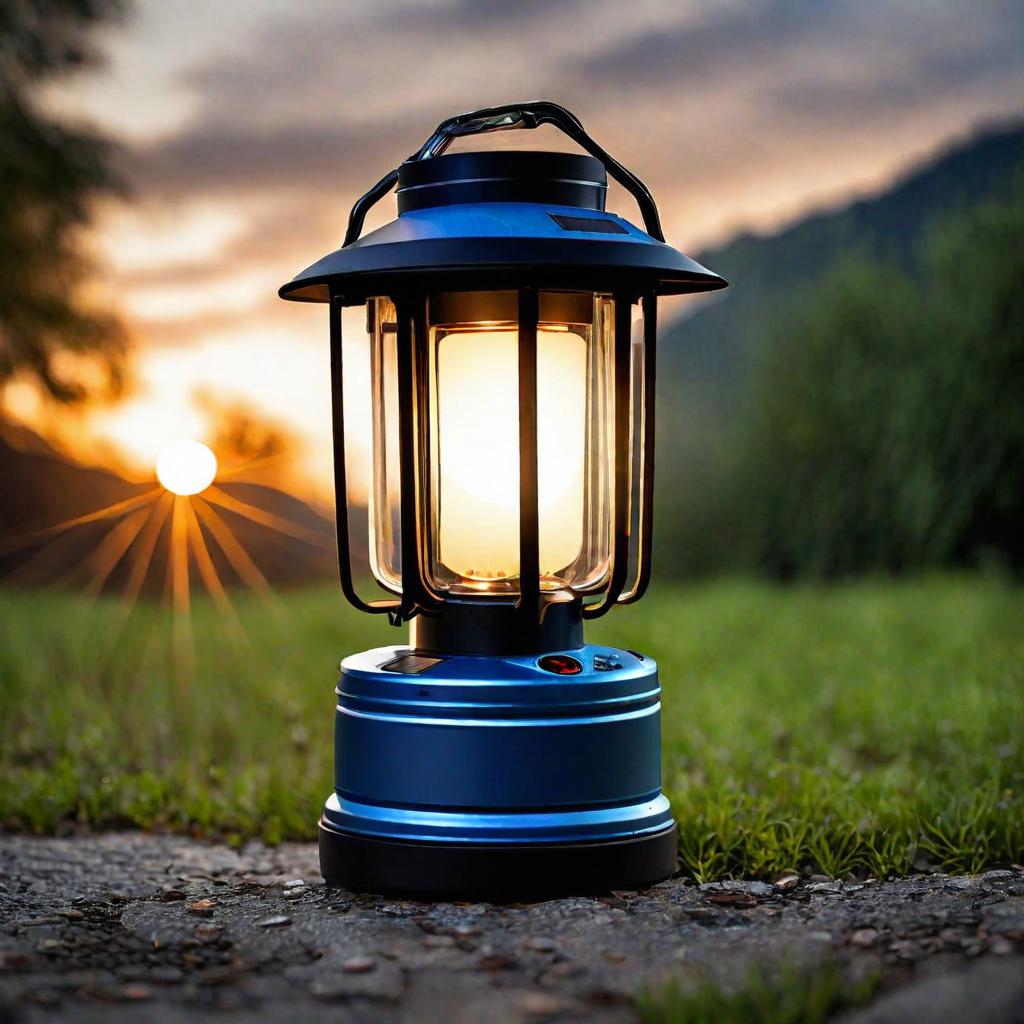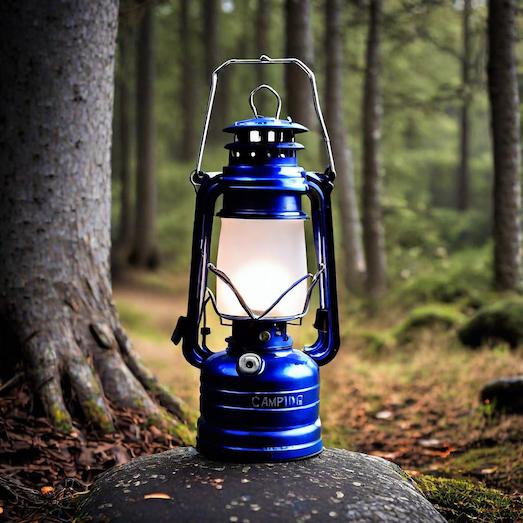When it comes to camping, one of the most essential pieces of gear you need is a reliable source of light. Whether you’re setting up your tent after dark, cooking dinner at the campsite, or navigating the trails at night, a good lantern is indispensable.
But with so many options on the market, it can be difficult to choose the right one. Two of the most popular types of lanterns for camping are solar-powered and battery-powered lanterns. Each has its own set of advantages and disadvantages, and the best choice depends on your specific needs and preferences.
In this article, we’ll explore the pros and cons of both solar and battery-powered lanterns, helping you decide which one is better suited for your camping adventures.
Understand Solar-Powered Lanterns
Solar-powered lanterns harness the energy of the sun to provide light. They typically have built-in solar panels that charge internal batteries during the day, which then power the lantern at night.
Pros of Solar-Powered Lanterns:
- Eco-Friendly: Solar-powered lanterns are environmentally friendly because they use renewable energy. They reduce your reliance on disposable batteries, which can be harmful to the environment when discarded improperly.
- Cost-Effective: Once you’ve made the initial investment in a solar lantern, you won’t need to purchase replacement batteries or fuel. This can save you money over time, especially if you’re an avid camper.
- Unlimited Power Source: As long as there’s sunlight, you can recharge your lantern. This makes solar lanterns particularly useful for extended camping trips where access to electricity may be limited.
- Low Maintenance: Solar lanterns require little maintenance. There’s no need to carry extra batteries or fuel, and you don’t have to worry about finding an electrical outlet to recharge.
Cons of Solar-Powered Lanterns:
- Dependent on Sunlight: The effectiveness of a solar lantern depends on the availability of sunlight. In cloudy or rainy weather, or if you’re camping in heavily forested areas, the lantern may not charge fully.
- Longer Charging Time: Solar lanterns typically require several hours of direct sunlight to charge fully. If you need immediate light or forget to charge the lantern during the day, you might be left in the dark.
- Lower Brightness: Some solar lanterns may not be as bright as battery-powered or fuel-powered alternatives, especially if they haven’t had enough time to charge.
Understand Battery-Powered Lanterns
Battery-powered lanterns rely on disposable or rechargeable batteries to provide light. They come in various sizes and styles, and their brightness and run time depend on the type of batteries used.
Pros of Battery-Powered Lanterns:
- Reliable Power Source: Battery-powered lanterns are reliable and provide consistent light as long as you have fresh batteries. They’re not dependent on weather conditions, making them a dependable choice in any situation.
- Bright Light Output: Battery-powered lanterns often have a higher light output compared to solar lanterns. They can illuminate larger areas and are ideal for tasks that require bright, focused light.
- Versatility: These lanterns come in a wide range of sizes and designs, from compact models that fit in your pocket to large lanterns that can light up an entire campsite. This versatility allows you to choose the right lantern for your specific needs.
- Quick and Easy to Use: Battery-powered lanterns are straightforward to use—just insert the batteries, and you’re ready to go. There’s no need to wait for them to charge, making them ideal for last-minute trips or emergencies.
Cons of Battery-Powered Lanterns:
- Ongoing Cost: The need to constantly replace batteries can add up over time. While rechargeable batteries can mitigate this cost, they still require a power source to recharge.
- Environmental Impact: Disposable batteries contribute to environmental waste, and improper disposal can lead to pollution. Rechargeable batteries are a more eco-friendly option, but they still have a limited lifespan.
- Heavier and Bulkier: Depending on the type of batteries used, battery-powered lanterns can be heavier and bulkier than their solar counterparts, making them less convenient for backpacking or lightweight camping trips.
Compare Brightness and Light Output
One of the most important factors to consider when choosing between solar and battery-powered lanterns is brightness. The brightness of a lantern is typically measured in lumens, and the higher the lumens, the brighter the light.
- Solar Lanterns: Generally, solar lanterns provide lower brightness compared to battery-powered models. They are designed to be energy-efficient, which can sometimes mean sacrificing brightness. However, advancements in solar technology have led to the development of solar lanterns that offer competitive light output.
- Battery-Powered Lanterns: These lanterns tend to offer higher brightness, making them ideal for illuminating large areas or performing tasks that require a lot of light, such as cooking or reading. If brightness is a top priority, a battery-powered lantern is likely the better choice.
Evaluate Charging and Power Considerations
The way you charge and power your lantern can significantly impact its convenience and usability during a camping trip.
- Solar Lanterns: Charging a solar lantern requires access to sunlight, which can be a limitation in certain environments or weather conditions. Most solar lanterns also come with a USB charging option, providing flexibility if sunlight is scarce. However, relying solely on solar power can be risky if you encounter several days of poor weather.
- Battery-Powered Lanterns: These lanterns are typically powered by disposable or rechargeable batteries. The advantage is that you can bring spare batteries to ensure you always have power. Rechargeable battery-powered lanterns can be charged via USB, making them convenient if you have access to a power source. However, the need to carry extra batteries or a charger can add to your gear load.
Considering Durability and Weather Resistance
Durability is another key factor, especially if you plan on using your lantern in rugged outdoor environments.
- Solar Lanterns: Many solar lanterns are designed with durability in mind, featuring weather-resistant and shockproof materials. However, the built-in solar panels can be vulnerable to damage if not handled carefully.
- Battery-Powered Lanterns: These lanterns are also built to be durable, with many models offering water-resistant or waterproof features. The absence of solar panels means they may be less fragile, making them suitable for rougher conditions.
Portability and Weight Considerations
When camping, especially if you’re hiking to your campsite, the weight and portability of your gear are crucial.
- Solar Lanterns: Solar lanterns are often lightweight and compact, making them easy to carry. Some models are collapsible, further enhancing their portability. However, if you need to bring a backup power source (like a USB charger), it can add to your gear.
- Battery-Powered Lanterns: These lanterns can be heavier and bulkier, especially if they require large batteries. However, there are many compact options available that are designed with portability in mind. If you’re concerned about weight, look for models that use smaller, lighter batteries.
Environmental Impact
For eco-conscious campers, the environmental impact of your gear is an important consideration.
- Solar Lanterns: Solar-powered lanterns are the more eco-friendly option since they rely on renewable energy. By eliminating the need for disposable batteries, they help reduce waste and pollution. However, the production of solar panels and batteries still has an environmental impact, though it’s generally less than that of disposable batteries.
- Battery-Powered Lanterns: The environmental impact of battery-powered lanterns depends largely on the type of batteries used. Disposable batteries contribute to environmental waste, particularly if they’re not disposed of properly. Rechargeable batteries are a better option, but they still have a limited lifespan and need to be replaced eventually.
Cost Analysis
The cost of camping gear is always a consideration, and this includes the initial purchase price as well as ongoing expenses.
- Solar Lanterns: While solar lanterns may have a higher upfront cost, they can be more cost-effective in the long run since you won’t need to purchase batteries. If you camp frequently, the savings on batteries can quickly offset the initial investment.
- Battery-Powered Lanterns: These lanterns are often more affordable upfront, but the cost of replacement batteries can add up over time. If you opt for rechargeable batteries, you’ll save money in the long run, but you’ll need to factor in the cost of a charger and possibly additional batteries.
Ease of Use and Convenience
Ease of use is another important factor, especially when you’re out in the wilderness and need reliable, straightforward gear.
- Solar Lanterns: Solar lanterns are generally easy to use, with the main consideration being ensuring they get enough sunlight during the day. Some models may take longer to charge, which can be inconvenient if you forget to set them out in the sun.
- Battery-Powered Lanterns: These lanterns are extremely easy to use—just insert the batteries and turn them on. They’re ready to go whenever you need them, making them a convenient option for situations where you need immediate light.
Which Lantern is Best for You?
The choice between a solar-powered and battery-powered lantern ultimately depends on your specific camping needs and preferences.
- Choose Solar Lanterns If:
- You’re eco-conscious and want to minimize your environmental impact.
- You’re planning an extended camping trip where access to batteries or power sources is limited.
- You’re camping in a sunny location where you can reliably charge your lantern each day.
- Choose Battery-Powered Lanterns If:
- You need a reliable and bright light source, regardless of weather conditions.
- You prefer the convenience of a lantern that’s ready to use immediately, without needing to charge.
- You’re camping in areas with limited sunlight or during seasons with shorter daylight hours.

Ralf Cook is an experienced outdoor enthusiast and the primary author at CampGearExperts. With over a decade of camping, hiking, and backpacking experience, he brings a wealth of knowledge to the site. Ralf is passionate about helping others enjoy the great outdoors safely and comfortably. He rigorously tests and reviews gear, ensuring readers receive accurate, reliable information.


